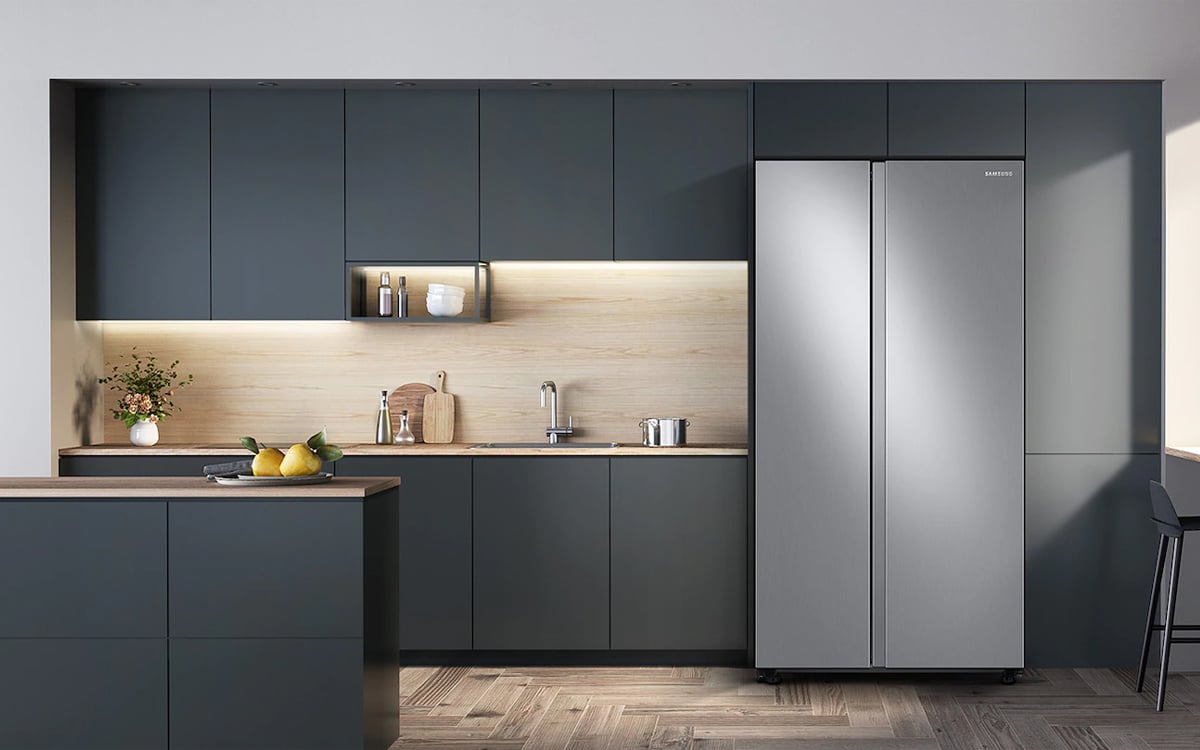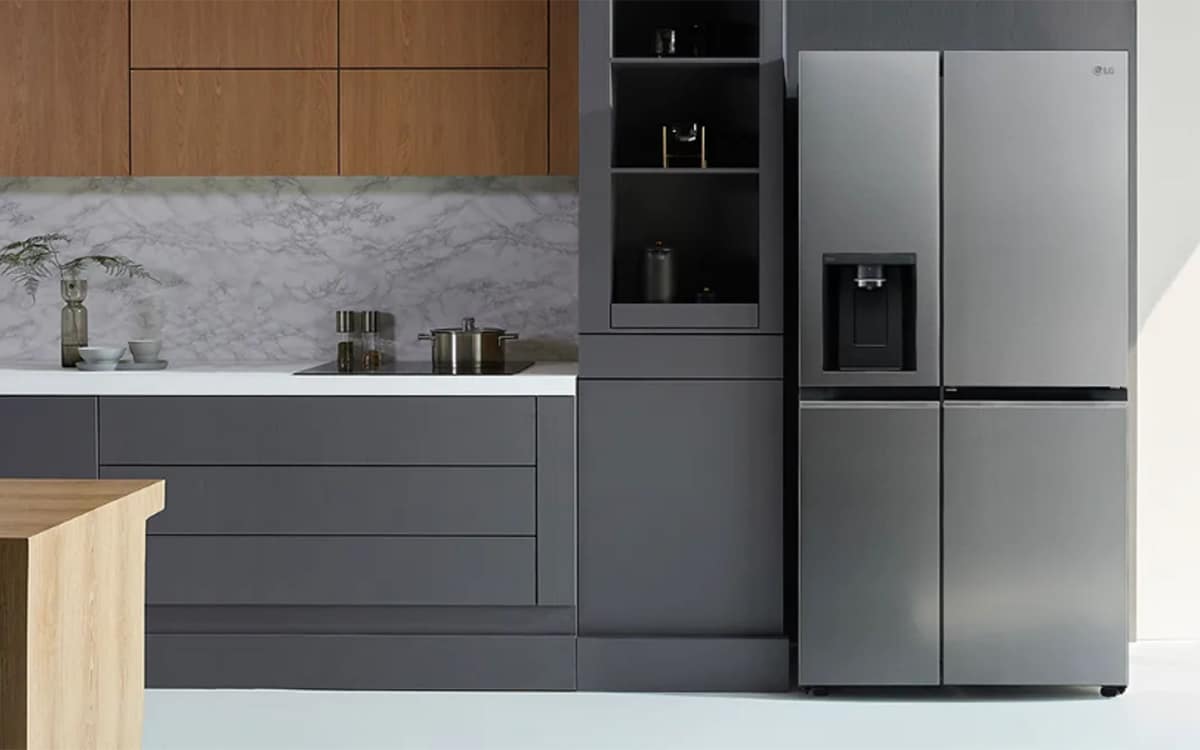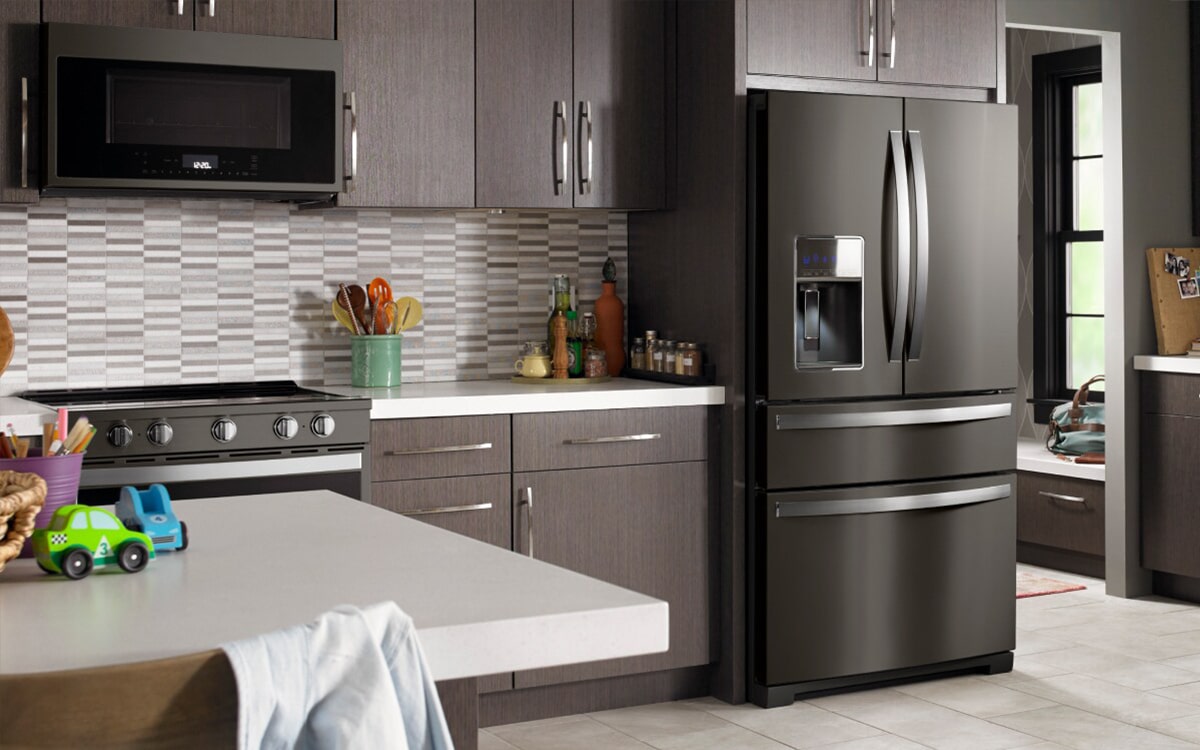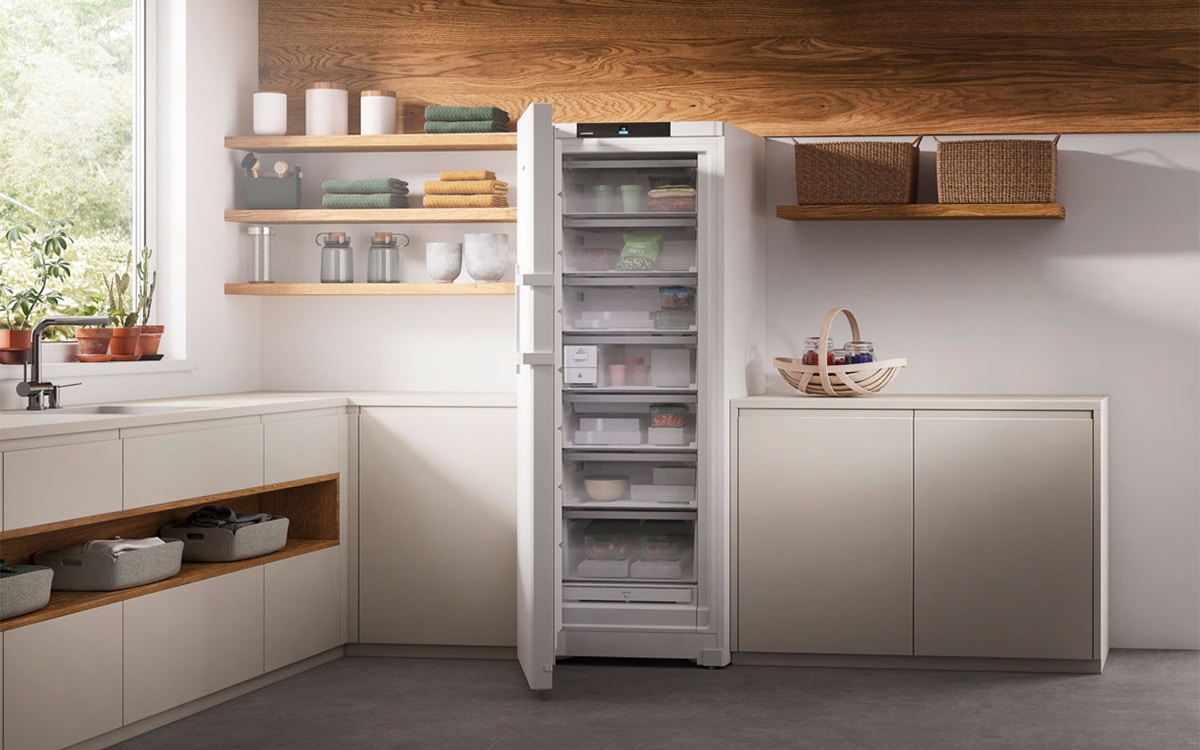But much like any other home appliance, a freezer is only ever quite as effective as its user. There’s a lot to learn about the humble freezer. The more you know about it, the more effectively you can use it, and bring a sense of rhythm into your kitchen.
That’s why we’ve set out to create this definitive guide to freezers. Using the decades of knowledge from our team of Reliant tech experts, we’re going to answer all of the biggest freezer questions. So that absolutely anyone can master the appliance, and make the most of it! Let’s get right into it!
How Does A Freezer Work?
At the most basic level, a freezer performs two basic functions. First, it withdraws heat from any items placed within it. Second, it then fills its main storage area with plenty of air cold enough to initiate the freezing process.
To do this, the average freezer uses four key parts: Condensor coils, an evaporator, a compressor, and a capillary tube. Let’s take a look at what each of these parts does, and how they work together to keep your food at sub-zero temperatures.
A freezer operates through a continuous cycle rather similar to a fridge. This cycle involves a refrigerant, which is a special compound designed to transfer heat, and that gets pumped around the unit. The first step involves the refrigerant entering the compressor. The compressor is designed to pressurise the refrigerant, which in turn raises its temperature.
A freezer works very similarly to a fridge. It sends a refrigerant through a cycle of compression and evaporation that removes the heat from your food, and slowly freezes it!
After the compressor has finished, the now-pressurised refrigerant moves through the condenser coils. These coils absorb the heat from the refrigerant and release it. This cools it down. As this happens, the refrigerant changes from a vapour into a liquid.
Once the refrigerant has travelled along the capillary tube, it reaches the evaporator. The evaporator is designed to remove any ounce of warmth left in the liquid, which also turns it back into a vapour! It’s this vapour that is then responsible for freezing your food!
Finally, once the vapour has done its job, it re-enters the cycle, starting at the compressor!
What Should You Consider When Looking For A Freezer?
If you’re in the market for a new freezer, there are a few things you’ll need to consider. Looking at these factors will help you to choose the perfect freezer in a sea of amazing options!
Size
Make sure you already have a space planned out for your new freezer. Whether you plan to keep it in the kitchen, or maybe the garage, you’ll want to make sure your new freezer fits seamlessly into place.
On the one hand, you want to make sure that your new freezer is big enough for storing all of your food, but you also need to make sure it’s not too big. A freezer that’s too big will simply become an annoyance, as you’ll have to wriggle past it just to get through the room!
If you’re low on available floor space in your kitchen, then we’d recommend looking for an under-counter freezer. As their name suggests, these freezers are designed to fit just under your counter, which saves plenty of space.
Understanding the amount of space you have available will help you to narrow down your options.
Capacity
Freezers are great for stocking up on plenty of food. So we’d recommend you grab one with plenty of space for all of those tasty goodies! Make sure to consider the amount of food you normally stock up on, and the number of mouths you have to feed. If you’re cooking dinner for the whole family every night, then you’ll need a freezer with much greater capacity.
Of course, freezer capacity will naturally tie in with the size of the unit. So we recommend that you take enough time to strongly consider how much storage capacity you need, and what space you have available for your freezer.
Type
Generally, there are two dominant types of freezers that you’ll most commonly encounter on the market. One is the standard upright type that has a vertical build similar to a standard fridge. These are a great option for saving floor space. Upright freezers have a much smaller footprint but make up for this with plenty of vertical storage space. They often come with plenty of drawers and moveable shelves, so you can make use of every inch.
The other type you’ll come across is the chest freezer. This type has a much wider shape and sits directly on the floor. What it lacks in height, it instead makes up for in width. This type of freezer is really great for maximising space, and making use of every inch of capacity. However, chest freezers have a very wide footprint, so you will need to make sure you have more than enough space to accommodate one!
Once again, your choice between different models will depend on the size of the unit, and the space you have available!
Extra Features
Freezers don’t often have too many extra bells and whistles. As long as your freezer has enough space for all of your food, and can maintain a consistent temperature, that will often be more than enough.
However, there are a few extra features that might be worth looking out for to improve your experience. In fact, we strongly recommend looking out for a freezer with some kind of defrosting system.
Desfrosting features can help to enhance the efficiency of your freezer. They help to cut down on time spent hacking away at stubborn ice, so you no longer have to dread the task!
There’s nothing freezer owners dread more than the inevitable task of defrosting. Luckily, many freezer manufacturers have accounted for how arduous the task can be. As such, many modern freezers now come with advanced defrosting features that allow them to quickly drip away all of that stubborn ice and bring back some space.
You might also want to look for a freezer with some kind of ice dispenser. Usually placed on the door of the unit, an ice dispenser allows you to quickly access ice for your favourite drinks. This is also beneficial for the efficiency of your freezer. Without having to open up your freezer every time you want a few ice cubes, your freezer can maintain its internal temperature more effectively.
Energy Efficiency
It’s always worth looking out for the most energy-efficient freezers on the market. After all, your freezer is going to be operating pretty much non-stop, to keep all of your food fresh. As such, you’ll want to ensure it’s not using too much electricity.
Make sure to look out for a strong energy rating. The closer the rating is to “A”, the more efficient the freezer will be. It’s best to steer clear of any freezers rated at “G”, as they consume a high amount of electricity and may cost you a lot more to operate.
You’ll be able to find “A”-rated freezers by looking for the attached energy rating label found on most home appliances. This label will allow you to quickly see what rating each freezer has, so you can make an informed decision.
It’s important to grab an efficient freezer. It helps to protect the environment, and also helps to lower your energy bills!
Price
It’s important to consider all of the above factors because they can all have a direct impact on the total price of your new freezer. If you want to save money, then you might want to opt for a much smaller freezer, with fewer bells and whistles.
If you want a fully-fledged freezer with enough capacity to feed the whole family, you should be prepared to spend a little bit more.
It’s good to have some idea of your budget before hunting for the perfect freezer, as it will help you narrow down your options. But be prepared to be flexible. You might find that the perfect freezer is just a few hundred pounds outside of your budget!
Is It Worth Getting A Fridge Freezer?
As you’ve likely noticed, this guide is dedicated entirely to independent freezers. By this, we mean freezers that do not exist as part of a larger fridge-freezer combination system. As such, you might wonder whether a fridge freezer is a bit more up your alley!
Fridge freezers are great for convenience, as they allow you to quickly grab both refrigerated and frozen goods all in one go. They’re also great for households that are limited in terms of available floor space.
Fridge-freezers help you to save a lot of space, by combining the two appliances into a single unit. This makes them great for smaller homes. However, they often have much less freezer storage space!
However, fridge-freezers often have very limited storage space available. As such, if you’re looking to really stock up on frozen goods, you’d benefit more from a freezer that stands on its own!
Ultimately, your decision will come down to the amount of storage you need, and the amount of space you have available in your chosen room.

What Temperature Should You Have A Freezer Set To?
Only a few freezers will give you the option to alter its internal temperature. Regardless, however, you should ensure that the temperature is at exactly 0 degrees Celsius. This is cold enough to freeze your food right away, and keep it frozen for as long as it’s stored away. It’s also not so cold as to directly damage your food, hampering its quality.
A good freezer should be able to easily achieve this temperature and then maintain it efficiently. It should also be able to account for the ways you interact with it. Whenever you open the door of a freezer, cold air leaves, and some warmer air enters the unit. An efficient freezer should be able to bring itself back to 0 degrees as quickly as possible, to preserve your food.
How Do You Make The Most Of A Freezer?
Despite freezers being so simple to use, you’ll still need to make sure you’re using them right. If you want to make the most of your freezer, we strongly recommend following some of these top tips.
Organise Your Freezer Efficiently
It’s really important to make full use of your freezer’s storage space. We recommend making use of at least 75% of your freezer’s storage space. This ensures that you don’t put any electricity to waste. It also ensures maximum efficiency. When your freezer is densely packed, it doesn’t need to work quite as hard to maintain its temperature. Just be careful not to overload your freezer, because this can block the air vents!
When placing food into your freezer, be sure to do so efficiently. This will make it much easier for you to find and withdraw specific items later on. It also, in turn, cuts down on the amount of time that your freezer door is left ajar and reduces the amount of electricity needed by your freezer.
We’d also recommend keeping an up-to-date list of everything you have stocked in the freezer. This way, you know what you need to stock up on, without even having to open the door!
Plan Your Meals!
Freezers are built for stocking up. So why not put that to good use? One great way to take advantage of a freezer is to stock it up with all kinds of ready-prepared meals. Plan the meals for the week ahead, prep them, and then drop them right into the freezer. This is a great option for people with busy lifestyles. It cuts down on time spent slaving away in the kitchen, and still allows you to enjoy truly amazing meals every single day!
Meal planning can be done with all kinds of dishes, for all times of day. Want a fuel-filled breakfast to get you through the day? Maybe a warming dinner to help you unwind? Meal planning makes it easy and simple.
Meal planning is a great way to make use of your freezer. It also helps to free up plenty of time in your busy day. Simply whip up some meals, box them up, and freeze them for the week ahead.
Meal planning is also great for calorie counting. You can guarantee that every single meal will have an exact calorie count. So you can stay on top of your diet, without any of the guesswork!
Bag Everything Up
Don’t simply drop food into your freezer willy-nilly! Instead, make sure to bag individual items up, to keep everything fresh. Using freezer bags is easily the most convenient option, as they help you to make the most of your freezer’s storage space. Unlike plastic tubs or other sealed containers, freezer bags can be sealed tightly. This means that you can stuff more of them into your freezer.
We’d recommend that you bag certain food items in distinct portions. For instance, bagging up chicken breasts individually makes it much easier to defrost and prepare enough food for one, without having to remove everything. Freezer bags also allow you to defrost items like chicken more safely. They’ll be kept completely sealed away from potential airborne contaminants.
Just make sure to label each of the bags. This will ensure you always know exactly what is in each bag, so you won’t ever find yourself confused!
Keep The Door Closed
Now, we’re not suggesting that you fill up your freezer with food and then never open it again! That would be crazy! Instead, we simply recommend that you cut down on time with the door spent open. Anytime you open your freezer door, cold air escapes, and warmer air quickly finds its way in. The longer you leave your freezer door open, the harder it will have to work to maintain a consistent temperature.
This is why efficiently bagging up and labelling your food is so beneficial. You won’t spend entire minutes digging through the freezer, just trying to find that one ingredient. This also means that the door won’t be left open for entire minutes at a time.
It’s important to keep your freezer’s door closed whenever it’s not in use. This keeps the cold air firmly locked in, which in turn helps to preserve your food for much longer.
Make sure to not leave your freezer open by accident. If you’re prone to accidentally leaving cabinet and wardrobe doors open, then make sure to grab a freezer with a “Door-open” alarm. This is designed to beep if the door is left open for a certain period. It can help to keep you from accidentally defrosting all of your food!
Why Does My Freezer Keep Icing Up?
It’s normal to see some amount of ice building up within your freezer. But you’ll want to carefully measure just how much ice is building up. Too much ice can actually do incredible damage to your freezer, or otherwise hamper its efficiency.
The reason why ice builds up along the walls and between the drawers of your freezer can be a number of things. In some cases, it can be because your freezer is having trouble maintaining a temperature. If your freezer is faulty, and having trouble maintaining temperature, then small amounts of moisture from your food will thaw, and then drip all over the freezer, before being frozen again. Notice that your freezer is faulty? We recommend that you get it looked at as soon as possible. A faulty freezer won’t be able to preserve your food as effectively.
Ice can also naturally build up as a result of moisture in the air. Whenever you open your freezer door, warm air enters. Even if the door is only open for just a few seconds. This warm air will naturally contain a small amount of moisture. This moisture will then gather within the inside surface of the freezer, before freezing up.
For the most part, ice build-ups are just a very natural part of using a freezer. So don’t worry too much when they appear.

Should A Freezer Make A Buzzing Noise?
Much like any other household appliance, freezers are prone to generating noise while in operation. This can of course result in an occasional buzzing noise coming from your freezer.
For the most part, buzzing and other noises from your freezer are totally natural. Buzzing, vibrations, and clicking sounds can all occur as a result of specific parts of the freezer, such as the compressor or coils.
When in operation, it’s perfectly normal for a freezer to make some amount of noise. But freezers are designed to operate as quietly as possible, so if yours is very loud, there’s likely a problem!
A freezer is much more likely to produce noise while in operation if it’s significantly older. This is because the parts will be more strained, and may be slightly out of position.
Noise from a freezer should only be a concern if it’s above a certain level. If you can hear your freezer operating from a different room, then you will need to get the problem fixed. Loud noises from your freezer may be due to age, or simply due to a manufacturing error of some kind.
What Should You Avoid Putting In The Freezer?
Luckily, most food can be kept in the freezer. However, there are a few distinct foods that you will want to keep far away!
Certain Fruits And Vegetables
Fruits and vegetables with high water content, like watermelon, cucumber, and oranges can technically be frozen, but they don’t thaw very well at all. When it does come time to thaw them, they’ll most often end up mushy and sloppy. The freezing and thawing process can easily destroy the integrity of a number of fruits and vegetables.
Certain fruits and vegetables don’t freeze very well. Those with high water content are particularly troublesome, as the processes of freezing and thawing can warp them significantly! They’ll feel and taste incredibly weird!
Potatoes also don’t take particularly well to the freezing process. This is because the water content of a potato will separate from the starch. Once the potato thaws, it will be incredibly watery, and just won’t feel right!
Eggs
If you need to freeze eggs, we recommend that you cook and prepare them first. This is because dropping still-shelled eggs into the freezer can be a recipe for disaster. When the insides of an egg are frozen, they naturally expand slightly. In no time, the shells of your eggs will be cracked! This could prove messy in your freezer, and will also make it difficult to cook those eggs without ending up with fragments of shell all over the finished dish!
Mayonnaise And Ketchup
Sauces like ketchup and mayonnaise unfortunately don’t take well to freezing. When frozen, the water content in these foods can be separated from the rest of the ingredients. This then results in weird and watery dips that lack the usual satisfaction you expect.
Cans And Bottles
The reason you should keep cans and bottles clear of your freezer is twofold. For one, the process of freezing will naturally result in liquids expanding. This can put a significant strain on the bottle or can itself. A water bottle that’s filled to the brim runs the risk of bursting within your freezer.
Water bottles and cans are also often highly pressurised. The force exerted from a bottle or can bursting could actually do direct damage to your freezer and the rest of your food!
Not only would a burst bottle or can be incredibly difficult to tidy up. It could also play havoc on the freezer itself!
Milk
Millions of people every year find themselves surprised when their freshly frozen milk comes out tasting odd and feeling incredibly lumpy. Again, the reason why milk can’t be frozen is simply because its many ingredients end up separating as a result of the process.
In fact, if a liquid is ever at risk of separating, you should be sure to keep it far away from your freezer.
How Long Can Food Stay In The Freezer?
Although a freezer can help your ingredients last much longer, it can’t make them last forever. After a certain amount of time, frozen foods run the risk of succumbing to freezer burn. Freezer burn damages the very cells that make up your food and saps away all semblance of flavour and texture.
You should aim to not leave food in your freezer for longer than 3 months. After 3 months, food can become incredibly susceptible to freezer burn. Freezer burn attacks the very cells of your food, rendering it tasteless!
Freezer burn will usually occur within 3 months, depending on the type of food. As such you should aim to consume any piece of food within 3 months of first freezing it.
If you wanted to get even more mileage out of certain foods, you could always use them to prepare a meal, and then place that new meal into the freezer.
Can You Refreeze Food?
It’s generally recommended to never refreeze anything that has been left to thaw outside of the freezer. The reason for this is that refreezing your food could lead to a change in taste and texture. Freezing and thawing are both processes that change how the cells of foods are organised. When food is frozen, the cells constrict. When food is thawed, the cells expand slightly. The more times you freeze and refreeze a piece of food, the more its texture and taste will change.
However, it’s totally fine to refreeze some foods, provided it’s only done once. Refreezing any more times will end up ruining your food completely!
You can also extend the lifespan of food by cooking it first before placing it back into the freezer. For instance, if you want to refreeze some chicken, simply cook a meal with it, and then place it right back into the freezer!
How Often Should You Defrost A Freezer?
It’s recommended to perform a full defrost on your freezer at least once a year. This helps to ensure that your freezer can work at its very best. When frost is left to build up to an extreme degree in your freezer, it can directly impact its performance. For one thing, it could lock drawers in place. As well as that, it could also build up on the ventilation fans and hamper temperature management.
It’s best to defrost your freezer at least once every year. It helps to keep your freezer working at its best. You shouldn’t need to do it more than once a year.
Ice build-ups in your freezer should never be more than a quarter of an inch thick. If you notice that they are, it might be a sign that you need to perform a quick defrost!

Frequently Asked Questions
What Should You Consider When Looking For A Freezer?
When you’re in the market for a new freezer, you’ll want to strike a balance between unit size and capacity. Of course, you want to make sure there’s enough space for all of your food. But you also want to make sure that your new freezer is not too big for your kitchen. A freezer two sizes too big will just be an obstacle!
What is A Good Freezer Capacity?
This will depend entirely on your unique situation! If you are stocking up on food to feed the whole family, then you should look for a freezer with a greater capacity. If you’re only looking to store food for one person, then you should look for a smaller unit. This ensures you can make full use of your new freezer’s storage space!







0 Comments